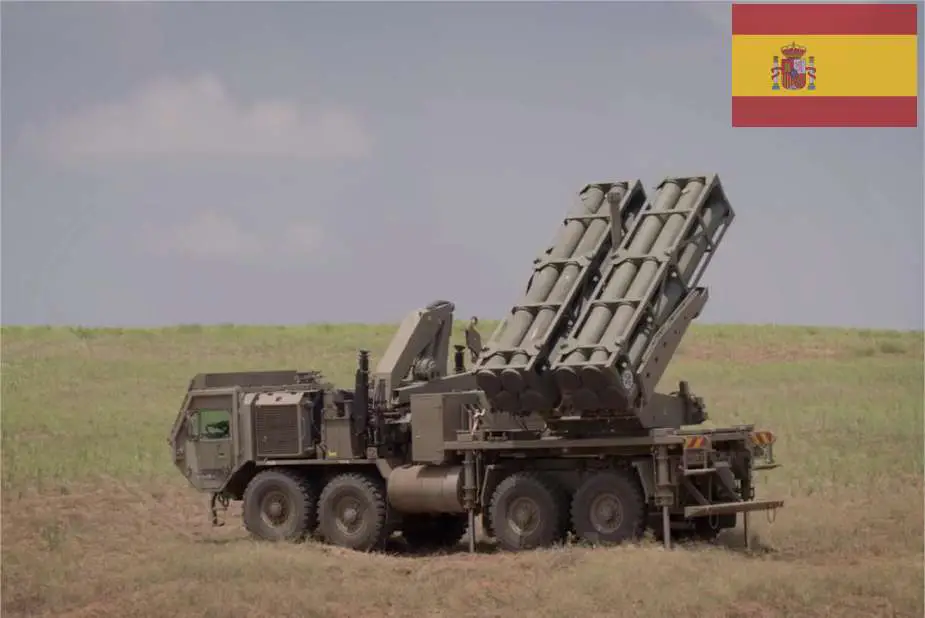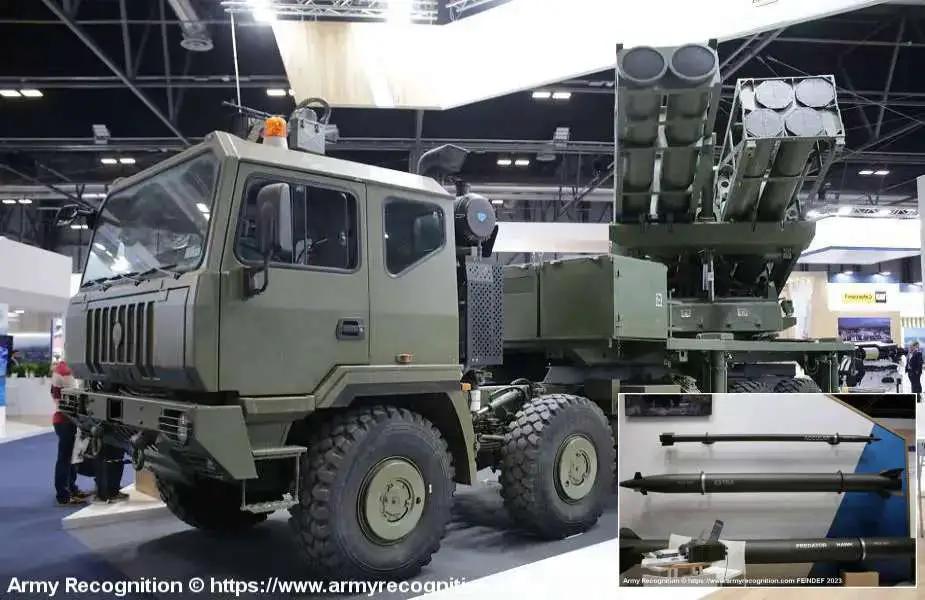Breaking news
Spanish Army to acquire 16 Israeli PULS rocket launchers in €700 Mn deal.
According to InfoDefensa on October 24, 2023, the Spanish Ministry of Defense recently disclosed by error the contract for the acquisition of the High Mobility Rocket Launcher System (SILAM) for the Spanish Army. Although the contract was later withdrawn, it provided valuable details about the program. According to the contract, valued at approximately €700 million, Spain plans to acquire 16 PULS rocket launchers, along with an initial ammunition package boasting a range of up to 300 km.
Follow Army Recognition on Google News at this link

The Precision Fires Launcher System (PULS), developed by the Israeli company Elbit Systems, can be mounted on various truck chassis. (Picture source: Elbit Systems)
The program's budget, inclusive of taxes, covers not only the launchers and an initial ammunition package but also additional equipment and systems, including a launcher demonstrator vehicle, twelve ammunition resupply vehicles with cranes, two recovery vehicles, six high-mobility reconnaissance vehicles, ten different types of command post vehicles, initial logistical support, instructional, training, and simulation assets, rocket launcher platforms for ammunition testing and validation, four multifunction radars, and four high-performance tactical UAS systems for target identification.
Regarding ammunition, the Ministry of Defense plans to procure an initial batch of 680 rockets. This includes 288 guided rockets with a range of 35 km (comprising 144 fragmentation and 144 penetration), along with 16 launch pods, 112 guided rockets with a range of up to 150 km (including 56 fragmentation and 56 penetration, with 28 pods), 64 rockets with a range of up to 300 km (consisting of 32 fragmentation and 32 penetration, along with 32 pods), and 216 training rockets with a range between 7 and 15 km.
The documentation published by the Ministry of Defense divides the budget into categories, with the fire system – encompassing launchers, ammunition, and related accessories – totaling €414.2 million (taxes included), the radar system costing €76.7 million, and the Remotely Piloted Aircraft Systems (RPAS) accounting for €204.6 million. The contract mentions the acquisition of reconnaissance drones, armed drones, and kamikaze drones. Furthermore, there is an allocation of nearly €2 million for integrating the Talos system, the command and control system used by the Spanish field artillery.
The delivery of launchers and training rockets is scheduled to commence in 2024, with live ammunition arriving from 2025 onwards. The Spanish Army will receive the final lots of rockets in 2028, adhering to the planned timeline.
The contract is currently in the evaluation phase at the Directorate General of Armaments and Material (DGAM), following the government's approval in mid-October. The contract's specifications make it clear that the chosen procurement process for the SILAM program is to "acquire the system from a national contractor supported by a foreign technologist." In this program, Defense will invoke Article 346 of the Treaty on the Functioning of the European Union (TFEU) to safeguard essential security interests.
The DGAM has established an industrial scheme for this program, including a primary contractor, two first-level subcontractors (one Spanish and one foreign technologist), and several second-level subcontractors. After considering the available options in the market, Defense has invited three Spanish companies to submit offers: SMS, Expal, and Escribano Mechanical & Engineering. The latter two have proposed the PULS rocket launcher system for the SILAM program in partnership with the Israeli manufacturer Elbit Systems, making it the likely choice, barring a major surprise. This solution was presented in May at the third edition of the International Defense and Security Fair (Feindef) held in Madrid.
The SILAM program outlines specific conditions that the rocket launcher system must meet. The technology transfer agreement will allow for the domestic production of rocket launchers and precision munitions, as well as the modernization and evolution of the core system throughout its life cycle. The system will have no legal or contractual restrictions on its use in operations. The operational life of SILAM is estimated to be 30 years, with the possibility of extension up to 40 years.
The need for rocket launchers is emphasized in the specifications, as they are considered essential for providing deep, powerful, and precise firepower. The absence of such platforms in the face of an adversary possessing them could result in a significant disparity in firepower, leaving the defending force vulnerable in scenarios involving area denial.

The PULS rocket launcher can be equipped with two pods that can launch both unguided and guided rockets with a maximum range of 40 km, in addition to missiles that can be fired with a maximum range of 300 km. (Picture source: Army Recognition)
The documentation further highlights the versatility of rocket launchers, which can fire various rockets and missiles, thus allowing for the engagement of different types of targets, whether they are light or fortified. This versatility is crucial for adhering to national restrictions on cluster munitions. Moreover, the use of guided rockets is stressed for their precision, which not only enhances the desired outcomes but also minimizes ammunition consumption, reducing the risk of collateral damage and fratricide. The system's ability to respond rapidly and its flexibility in configuring launchers with different types of ammunition enables it to be employed in a wide range of mission scenarios, including fire support for maneuver units, counter-battery actions, and contributing to the suppression of air defenses.
The PULS rocket launcher system is gaining increasing popularity in the global market. It has been chosen by Germany, Morocco, the Netherlands, and Denmark. Under the name of Lynx, it is currently in use in Azerbaijan, Kazakhstan, and Rwanda. In Israel, it goes by the name Lahav and has also undergone testing in Thailand.
The Precision Fires Launcher System (PULS), developed by the Israeli company Elbit Systems, represents a mobile artillery rocket system tailored to meet the demands of modern warfare. This system offers precise and versatile capabilities for launching rockets and missiles, which have the potential to enhance contemporary military operations.
At the heart of the PULS system lies its precision in firing, boasting an effective range of up to 300 km. This extended reach allows the system to engage targets accurately, even at considerable distances.
The PULS launcher is equipped with two pods, each specialized for specific rocket variants, enhancing its adaptability. These rocket types include the Accular 122mm (with 18 rockets, reaching distances of up to 35 km), the Accular 160mm (10 rockets, with a range of up to 40 km), EXTRA (4 rockets, capable of reaching up to 150 km), and the Predator Hawk (2 rockets, with a range of 300 km). This diverse range of rocket types enables the system to address a wide array of threats, ranging from close-range tactical targets to distant strategic objectives.
Designed for swift mission execution, the system can initiate and complete a typical firing mission in less than one minute. This rapid response time ensures that the system can deliver timely fire support on the battlefield. Its versatility allows for integration with a variety of military vehicles, whether tracked or wheeled, with minimal modifications required. This adaptability has the potential to reduce the costs associated with system implementation and maintenance, making it a practical solution for achieving advanced rocket and missile launching capabilities.
In contrast to conventional artillery systems that necessitate repositioning for different firing ranges, the PULS system can fire various rocket types and engage targets at different distances from the same location. This flexibility could significantly enhance its effectiveness in dynamic battlefield scenarios.



















